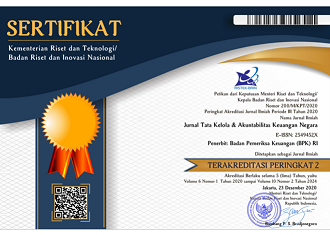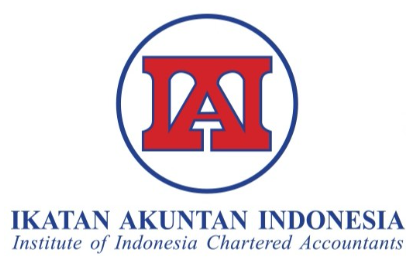MANDATORY AUDITOR ROTATION: THE PERCEIVED BENEFITS AND DRAWBACKS (A CASE STUDY IN BPK)
DOI:
https://doi.org/10.28986/jtaken.v6i1.394Keywords:
Mandatory rotation, benefits, drawbacks, independence, BPKAbstract
After years of implementation of the policy, there is an inconclusive opinion of whether a mandatory auditor rotation could improve the independence of auditors, including those working within the public sector, such as BPK. This study intends to empirically test the impact of mandatory rotation towards auditors' independence in fact and in appearance. Additionally, the study examines how auditor satisfaction towards the policy affects their perceived benefits and drawbacks of the scheme. Following a statistical assessment of primary data using the independent-samples t-test, findings show that independence in appearance of auditors would be enhanced as a result of mandatory rotation. The rotation policy, however, could not by itself improve auditors’ independence in fact. Consequently, complementary schemes are needed to preserve the independence in fact of auditors. Further, auditors who have a favorable view of mandatory rotation would assume that the mechanism offers more advantages than disadvantages. On the other hand, unhappy employees would perceive that mandatory rotation brings more adverse effects than positive ones. The vast majority of respondents also believe that the rotation mechanism is necessary to be implemented in BPK. Lastly, a number of valuable respondent inputs aimed to improve the rotation scheme are elaborated in this study.References
Alfayad, Z., & Arif, L. S. M. (2017). Employee voice and job satisfaction: An application of Herzberg's two-factor theory. International Review of Management and Marketing, 7(1), 150-156.
Al-Khoury, A. F., Ali, A., Al-Sharif, M., Hanania, J., Al-Malki, I. & Jallad, M. (2015). Auditor independence and mandatory auditor rotation in Jordan. International Business Research, 8(4), 73-82. doi:10.5539/ibr.v8n4p73
Al-Thuneibat, A. A., Issa, R. T. I. A., & Baker, R. A. B. (2011). Do audit tenure and firm size contribute to audit quality? Managerial Auditing Journal, 26(4), 317-334. doi: 10.1108/ 02686901111124648
Anggraini, P., & Putra, R. N. (2018). Elements which trigger employee’s intention to disclose fraud via a whistleblowing system: A case study. Jurnal Tata Kelola dan Akuntabilitas Keuangan Negara, 4(2), 105-124. doi: 10.28986/jtaken.v4i2.203
Anis, A. (2014). Auditors’ perceptions of audit firm rotation impact on audit quality in Egypt. Accounting and Taxation, 8(1), 105-120.
Boon, K., McKinnon, J., & Ross, P. (2008). Audit service quality in mandatory audit tendering: Preparer perceptions and satisfaction. Accounting Research Journal, 21(2), 93-122. doi: 10.1108/10309610810905917
BPK RI. (2010). Decree of the Secretariat General of BPK Number 366/K/X-XIII.2/9/2010 concerning The Rotation of BPK’s Employees (Keputusan Sekretaris Jenderal Badan Pemeriksa Keuangan Republik Indonesia Nomor 366/K/X-XIII.2/9/2010 tentang Pemindahan Pegawai Non Struktural pada Pelaksana Badan Pemeriksa Keuangan).
BPK RI. (2013). Decree of the Secretariat General of BPK Number 662/K/X-XIII.2/11/2013 concerning The Rotation Pattern in BPK (Keputusan Sekretaris Jenderal Badan Pemeriksa Keuangan Republik Indonesia Nomor 662/K/X-XIII.2/11/2013 tentang Pedoman Pola Pemindahan Pemeriksa di Lingkungan Badan Pemeriksa Keuangan).
BPK RI. (2017). Decree of the Audit Board of the Republic of Indonesia Number 14/K/I-XIII.2/9/2017 concerning the Fourth Amendment of the Decree Number 3/K/I-XIII.2/7/2014 concerning Organization Structure of the State Audit Board of the Republic of Indonesia (Keputusan Badan Pemeriksa Keuangan Nomor 14/K/I-XIII.2/9/2017 tentang Perubahan Keempat atas Keputusan Badan Pemeriksa Keuangan Nomor 3/K/I-XIII.2/7/2014 tentang Organisasi dan Tata Kerja Pelaksana Badan Pemeriksa Keuangan).
BPK RI. (2018). BPK Regulation Number 4 Year 2018 concerning Code of Ethics in BPK (Peraturan BPK Nomor 4 Tahun 2018 tentang Kode Etik Badan Pemeriksa Keuangan). Retrieved from https://peraturan.bpk.go.id/Home/Details/101834/peraturan-bpk-no-4-tahun-2018
Chiang, C. (2016). Conceptualizing the linkage between professional scepticism and auditor independence. Pacific Accounting Review, 28(2), 180-200. doi: 10.1108/PAR-08-2015-0034
Chu, B., & Hsu, Y. (2018). Non-audit services and audit quality - the effect of Sarbanes-Oxley act. Asia Pacific Management Review, 23(3), 201-208. doi: 10.1016/j.apmrv.2017.07.004
Dattin, C. F. (2017). Developments in France regarding the mandatory rotation of auditors: Do they enhance auditors' independence? Accounting History, 22(1), 44-66. doi: 10.1177/1032373216674968
Fernando, G. D., Abdel-Meguid, A., & Elder, R. J. (2010). Audit quality attributes, client size and cost of equity capital. Review of Accounting & Finance, 9(4), 363-381. doi: 10.1108/14757701011094571
Harris, K., & Whisenant, S. (2012). Mandatory audit rotation: An international investigation. Retrieved from https://pdfs.semanticscholar.org/0b84/54548ab6be3c8c7a2567ac32848672f0a358.pdf
Komalasari, N. (2016). Does the rotation of head of audit office across offices impact audit quality? Study case of the Audit Board of Republic of Indonesia. Jurnal Tata Kelola dan Akuntabilitas Keuangan Negara, 2(2), 137-150. doi: 10.28986/jtaken.v2i2.61
Law of the Republic of Indonesia Number 15 of 2006 concerning the Audit Board (Undang-Undang Nomor 15 Tahun 2006 tentang Badan Pemeriksa Keuangan). Retrieved from http://bandung.bpk.go.id/files/2009/03/UU-15-Tahun-2006.pdf
Lennox, C. (2014). Auditor tenure and rotation. In David Hay, W. Robert Knechel and Marleen Willekens (eds.), The Routledge Companion to Auditing. New York: Routledge, 89-106
Loke, C. H., Ismail, S., & Fatima, A. H. (2016). The perception of public sector auditors on performance audit in Malaysia: An exploratory study. Asian Review of Accounting, 24(1), 90-104. doi: 10.1108/ARA-12-2013-0082
Nagy, A. J. (2008). Financial information systems service providers and the internal control report. Managerial Auditing Journal, 23(6), 596-608. doi: 10.1108/02686900810882129
Nicolaescu, E. (2014). The effects of audit firm rotation on earnings quality. Economics, Management and Financial Markets, 9(1), 148-153.
Ottaway, J. (2014). Improving auditor independence in Australia: Is mandatory audit firm rotation the best option? Retrieved from https://law.unimelb.edu.au/__data/assets/pdf_file/0004/1709509/27-OTTAWAYJoanne-MandatoryAuditFirmRotationPaper2.pdf (Accessed 26 August 2019)
Roy, M. N. (2015). Statutory auditors' independence in the protection of stakeholders' interest: A perceptual study. IUP Journal of Corporate Governance, 14(1), 40-67. Retrieved from https://search.proquest.com/docview/1691987087?accountid=86413
Sinason, D. H. (2000). A study of the effects of accountability and engagement risk on auditor materiality decisions in public sector audits. Journal of Public Budgeting, Accounting & Financial Management, 12(1), 1-21. doi: 10.1108/JPBAFM-12-01-2000-B001
Siregar, S. (2013). Metode penelitian kuantitatif: Dilengkapi dengan perbandingan perhitungan manual dan SPSS. Jakarta: Kencana Prenada Media Group.
Smerek, R. E., & Peterson, M. (2007). Examining Herzberg's theory: Improving job satisfaction among non-academic employees at a university. Research in Higher Education, 48(2), 229-250. doi: 10.1007/s11162-006-9042-3
Tan, S. L. C., & Lau, C. M. (2012). The impact of performance measures on employee fairness perceptions, job satisfaction, and organizational commitment. Journal of Applied Management Accounting Research, 10(2), 57-72.
Tso, G. K. F. T., Liu, F., & Li, J. (2015). Identifying factors of employee satisfaction: A case study of Chinese resource-based state-owned enterprises. Social Indicator Research, 123(2), 567-583. doi: 10.1007/s11205-014-0750-3
Tuovila, A. (2019). Unqualified opinion. Retrieved from https://www.investopedia.com/terms/u/unqualified-opinion.asp
Al-Khoury, A. F., Ali, A., Al-Sharif, M., Hanania, J., Al-Malki, I. & Jallad, M. (2015). Auditor independence and mandatory auditor rotation in Jordan. International Business Research, 8(4), 73-82. doi:10.5539/ibr.v8n4p73
Al-Thuneibat, A. A., Issa, R. T. I. A., & Baker, R. A. B. (2011). Do audit tenure and firm size contribute to audit quality? Managerial Auditing Journal, 26(4), 317-334. doi: 10.1108/ 02686901111124648
Anggraini, P., & Putra, R. N. (2018). Elements which trigger employee’s intention to disclose fraud via a whistleblowing system: A case study. Jurnal Tata Kelola dan Akuntabilitas Keuangan Negara, 4(2), 105-124. doi: 10.28986/jtaken.v4i2.203
Anis, A. (2014). Auditors’ perceptions of audit firm rotation impact on audit quality in Egypt. Accounting and Taxation, 8(1), 105-120.
Boon, K., McKinnon, J., & Ross, P. (2008). Audit service quality in mandatory audit tendering: Preparer perceptions and satisfaction. Accounting Research Journal, 21(2), 93-122. doi: 10.1108/10309610810905917
BPK RI. (2010). Decree of the Secretariat General of BPK Number 366/K/X-XIII.2/9/2010 concerning The Rotation of BPK’s Employees (Keputusan Sekretaris Jenderal Badan Pemeriksa Keuangan Republik Indonesia Nomor 366/K/X-XIII.2/9/2010 tentang Pemindahan Pegawai Non Struktural pada Pelaksana Badan Pemeriksa Keuangan).
BPK RI. (2013). Decree of the Secretariat General of BPK Number 662/K/X-XIII.2/11/2013 concerning The Rotation Pattern in BPK (Keputusan Sekretaris Jenderal Badan Pemeriksa Keuangan Republik Indonesia Nomor 662/K/X-XIII.2/11/2013 tentang Pedoman Pola Pemindahan Pemeriksa di Lingkungan Badan Pemeriksa Keuangan).
BPK RI. (2017). Decree of the Audit Board of the Republic of Indonesia Number 14/K/I-XIII.2/9/2017 concerning the Fourth Amendment of the Decree Number 3/K/I-XIII.2/7/2014 concerning Organization Structure of the State Audit Board of the Republic of Indonesia (Keputusan Badan Pemeriksa Keuangan Nomor 14/K/I-XIII.2/9/2017 tentang Perubahan Keempat atas Keputusan Badan Pemeriksa Keuangan Nomor 3/K/I-XIII.2/7/2014 tentang Organisasi dan Tata Kerja Pelaksana Badan Pemeriksa Keuangan).
BPK RI. (2018). BPK Regulation Number 4 Year 2018 concerning Code of Ethics in BPK (Peraturan BPK Nomor 4 Tahun 2018 tentang Kode Etik Badan Pemeriksa Keuangan). Retrieved from https://peraturan.bpk.go.id/Home/Details/101834/peraturan-bpk-no-4-tahun-2018
Chiang, C. (2016). Conceptualizing the linkage between professional scepticism and auditor independence. Pacific Accounting Review, 28(2), 180-200. doi: 10.1108/PAR-08-2015-0034
Chu, B., & Hsu, Y. (2018). Non-audit services and audit quality - the effect of Sarbanes-Oxley act. Asia Pacific Management Review, 23(3), 201-208. doi: 10.1016/j.apmrv.2017.07.004
Dattin, C. F. (2017). Developments in France regarding the mandatory rotation of auditors: Do they enhance auditors' independence? Accounting History, 22(1), 44-66. doi: 10.1177/1032373216674968
Fernando, G. D., Abdel-Meguid, A., & Elder, R. J. (2010). Audit quality attributes, client size and cost of equity capital. Review of Accounting & Finance, 9(4), 363-381. doi: 10.1108/14757701011094571
Harris, K., & Whisenant, S. (2012). Mandatory audit rotation: An international investigation. Retrieved from https://pdfs.semanticscholar.org/0b84/54548ab6be3c8c7a2567ac32848672f0a358.pdf
Komalasari, N. (2016). Does the rotation of head of audit office across offices impact audit quality? Study case of the Audit Board of Republic of Indonesia. Jurnal Tata Kelola dan Akuntabilitas Keuangan Negara, 2(2), 137-150. doi: 10.28986/jtaken.v2i2.61
Law of the Republic of Indonesia Number 15 of 2006 concerning the Audit Board (Undang-Undang Nomor 15 Tahun 2006 tentang Badan Pemeriksa Keuangan). Retrieved from http://bandung.bpk.go.id/files/2009/03/UU-15-Tahun-2006.pdf
Lennox, C. (2014). Auditor tenure and rotation. In David Hay, W. Robert Knechel and Marleen Willekens (eds.), The Routledge Companion to Auditing. New York: Routledge, 89-106
Loke, C. H., Ismail, S., & Fatima, A. H. (2016). The perception of public sector auditors on performance audit in Malaysia: An exploratory study. Asian Review of Accounting, 24(1), 90-104. doi: 10.1108/ARA-12-2013-0082
Nagy, A. J. (2008). Financial information systems service providers and the internal control report. Managerial Auditing Journal, 23(6), 596-608. doi: 10.1108/02686900810882129
Nicolaescu, E. (2014). The effects of audit firm rotation on earnings quality. Economics, Management and Financial Markets, 9(1), 148-153.
Ottaway, J. (2014). Improving auditor independence in Australia: Is mandatory audit firm rotation the best option? Retrieved from https://law.unimelb.edu.au/__data/assets/pdf_file/0004/1709509/27-OTTAWAYJoanne-MandatoryAuditFirmRotationPaper2.pdf (Accessed 26 August 2019)
Roy, M. N. (2015). Statutory auditors' independence in the protection of stakeholders' interest: A perceptual study. IUP Journal of Corporate Governance, 14(1), 40-67. Retrieved from https://search.proquest.com/docview/1691987087?accountid=86413
Sinason, D. H. (2000). A study of the effects of accountability and engagement risk on auditor materiality decisions in public sector audits. Journal of Public Budgeting, Accounting & Financial Management, 12(1), 1-21. doi: 10.1108/JPBAFM-12-01-2000-B001
Siregar, S. (2013). Metode penelitian kuantitatif: Dilengkapi dengan perbandingan perhitungan manual dan SPSS. Jakarta: Kencana Prenada Media Group.
Smerek, R. E., & Peterson, M. (2007). Examining Herzberg's theory: Improving job satisfaction among non-academic employees at a university. Research in Higher Education, 48(2), 229-250. doi: 10.1007/s11162-006-9042-3
Tan, S. L. C., & Lau, C. M. (2012). The impact of performance measures on employee fairness perceptions, job satisfaction, and organizational commitment. Journal of Applied Management Accounting Research, 10(2), 57-72.
Tso, G. K. F. T., Liu, F., & Li, J. (2015). Identifying factors of employee satisfaction: A case study of Chinese resource-based state-owned enterprises. Social Indicator Research, 123(2), 567-583. doi: 10.1007/s11205-014-0750-3
Tuovila, A. (2019). Unqualified opinion. Retrieved from https://www.investopedia.com/terms/u/unqualified-opinion.asp
Downloads
Submitted
2019-12-19
Accepted
2020-05-12
Published
2020-06-28
How to Cite
Anggraini, P. (2020). MANDATORY AUDITOR ROTATION: THE PERCEIVED BENEFITS AND DRAWBACKS (A CASE STUDY IN BPK). Jurnal Tata Kelola Dan Akuntabilitas Keuangan Negara, 6(1), 35–55. https://doi.org/10.28986/jtaken.v6i1.394
Issue
Section
Articles
License

Jurnal Tata Kelola dan Akuntabilitas Keuangan Negara is licensed under
a Creative Commons Attribution-ShareAlike 4.0 International License




















